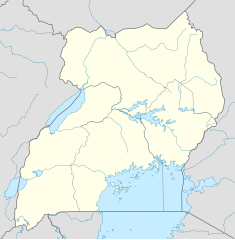Mubuku I Power Station is a 5 megawatts (6,700 hp) mini-hydroelectric power station in Uganda.
| Mubuku I Power Station | |
|---|---|
| Country | Uganda |
| Location | Kitoko, Kasese District |
| Coordinates | 00°19′07″N 30°06′00″E / 0.31861°N 30.10000°E |
| Status | Operational |
| Owner(s) | Kilembe Mines Limited |
| Dam and spillways | |
| Impounds | Mubuku River |
| Reservoir | |
| Normal elevation | 1,180 m (3,870 ft) |
| Commission date | 1950s |
| Type | Run-of-the-river |
| Turbines | 2 |
| Installed capacity | 5 MW (6,700 hp) |
Location
editThe power station is located between Bugoye and Kitoko, straddling the Mubuku River in Kasese District in Western Uganda. The station is in the foothills of the Rwenzori Mountains, close to the border with the Democratic Republic of the Congo. Kitoko lies approximately 20 kilometres (12 mi), by road, north of Kasese, the location of the district headquarters and the nearest large city.[1]
History
editKilembe Mines Limited built the state in the 1950s to power the extraction of copper ore from the Rwenzori Mountains.[2] The copper extraction ceased in the 1970s, and the power generated is now sold to the national grid. The Mubuku I Power Station is the third mini-hydropower station on the Mubuku River. The other two are the Mubuku II Power Station, commonly known as the Bugoye Power Station and owned by Tronder Power Limited, a Norwegian company, and the Mubuku III Power Station, owned by Kasese Cobalt Company Limited with an installed capacity of 10 megawatts (13,000 hp).
Overview
editThe station is a run-of-the-river mini-hydropower installation, with installed capacity of 5 megawatts. In September 2013, Ugandan print media indicated that the Tibet-Hima Consortium, the Chinese company that won the concession to run Kilembe Mines for the next twenty five years, has plans to increase capacity of the power plant to 12 megawatts. [3][4] The concession agreement was later terminated in September 2017 following reports of failure by Tibet-Hima to meet obligations stipulated in the agreement.
See also
editReferences
edit- ^ "Map Showing Kasese And Kitoko With Distance Marker". Globefeed.com. Retrieved 6 May 2014.
- ^ Ssepuya, Mikaili (5 July 2007). "River Mubuku Plant To Avail 10Mega Watts". New Vision. Archived from the original on 7 May 2014. Retrieved 6 May 2014.
- ^ Kulabako, Faridah (11 September 2013). "UShs450 Billion Kilembe Investment To Benefit Local Communities". Daily Monitor. Retrieved 6 May 2014.
- ^ Kiiza, Innocent (18 February 2014). "Kilembe Mines To Produce 12 Megawatts". The Observer (Uganda). Retrieved 6 May 2014.
